ASIA'S FUTURE CITIES: Can Bangkok pedal to a traffic revolution?
With Bangkok's notorious traffic set to get worse as the city's population grows, could getting more people to use bicycles offer some respite?
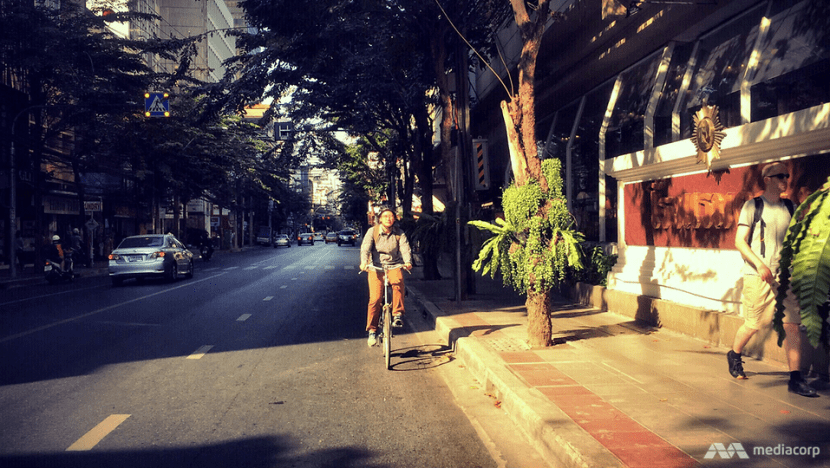
"I wish Bangkok could one day be a friendly place not only for car users but also cyclists and pedestrians," said Bangkok resident Thanyarat Doksone. (Photo: Pichayada Promchertchoo)
BANGKOK: For road commuters in Bangkok, traffic jams are a daily ritual with hardly anyone expecting a smooth and speedy journey to their destination. Many fill the time in their car by eating breakfast, putting on makeup, reading books or playing with their phones. It is a daily ordeal that is getting worse.
“It’s a struggle to get from point A to point B by car,” said Bangkok resident Thanyarat Doksone after hopping off her bicycle. She often cycles from home to work, zigzagging through Bangkok’s congested roads and gliding along empty bicycle lanes. Her journey takes 15 minutes instead of what would be 45 minutes by car.
Like increasing numbers of Bangkokians, Thanyarat has opted to use a bike for daily commute because it saves time. “Public transport isn’t really accessible everywhere, or punctual. Cycling, on the others hand, is very convenient and lets me manage my time.”
Time is precious in Bangkok but hard to manage with its notorious traffic. It is one of the top 10 global cities with the worst road congestion. And things look set to get even worse with an additional one million vehicles expected to cram into the already crowded capital in just over a decade. So, before that day comes, city officials plans to get as many commuters on bicycles as possible.
“The Bangkok Metropolitan Administration (BMA) has a clear policy to improve public transport. Within 15 years, it plans to expand the track-based network to cover a bigger area and promote cycling in the city,” said chief of the City Hall’s Traffic Information Technology Center Khrueafa Boonduang.
“We’ll widen pavements and bicycle lanes in the inner city area, and connect them to the mass transit system.”
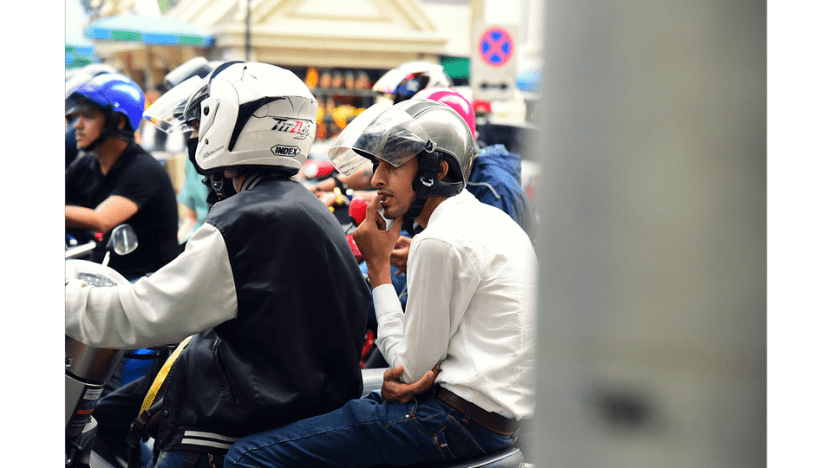
Road congestion in Bangkok is one of the worst in the world. (Photo: Pichayada Promchertchoo)
Discussions now centre on a master plan to improve the city’s infrastructure to accommodate bicycles. It is a joint effort between the BMA and urban cyclists to transform Bangkok from a car-centric city into a metropolis where all travellers get to enjoy the road network equally.
“We live in a disorderly society with an unjust transport system. Cars are still like the mafia on the road. In order to stop Bangkok’s traffic nightmare, we need to redesign our transport system,” said Sira Leepipattanawit from Green World Foundation, a non-profit organisation that actively advocates bicycles as a means of commuting.
“The transport system should cover every area. Everyone should have an equal right to it. And bicycles have a role to play.”
THROUGH LANES AND ALLEYWAYS
One of Bangkok’s best kept secrets is its massive network of shortcuts. Hidden lanes and alleyways spread through its thick concrete jungle like an urban maze that, if cracked, could get people to their destination quickly and efficiently.
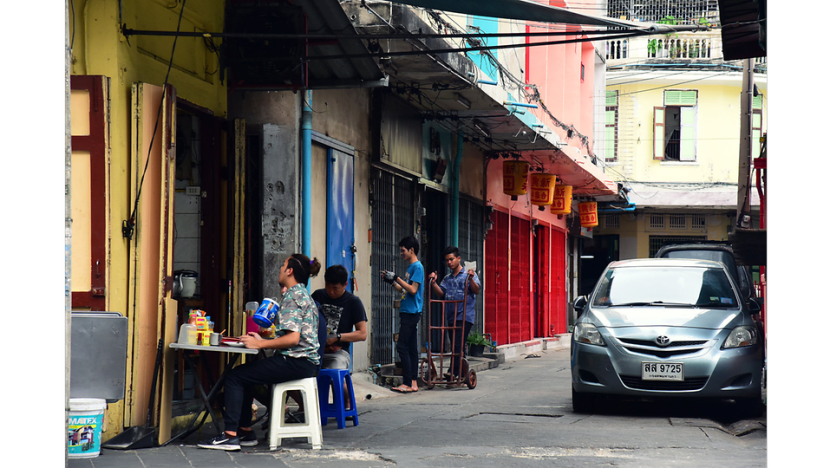
Bangkok is full of lanes and alleyways that pedestrians and cyclists can use as shortcuts. (Photo: Pichayada Promchertchoo)
Many of these secret passages are small and thus known only among pedestrians and cyclists. Many weave through the nooks and crannies in their daily escape from the heavy traffic on the main roads.
“If you compare the mass transit network to an artery, cycling and walking are like small veins that bring people from their home to the main system. Since these tiny alleyways can’t be reached by public transport, bicycles can be the connector,” Sira said.
With that vision, Green World Foundation has spent two years developing a mobile application that helps cyclists uncover these secrets.
Dubbed Pun Muang, or Cycling City, the app functions like Google Maps for cyclists in Bangkok. Users not only share information about bicycle routes but also safe parking spots, bike-sharing stations and other facilities such as bicycle shops, where they can stop for repairs.
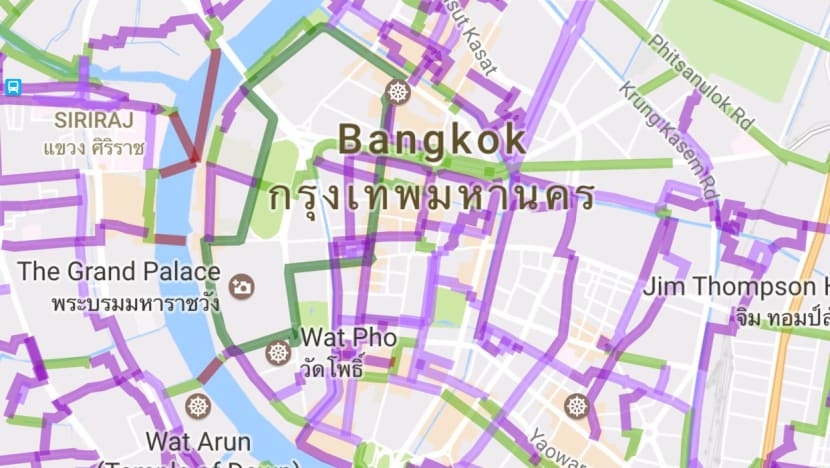
Pun Muang functions like Google Maps for cyclists in Bangkok. (Photo: Pichayada Promchertchoo)
The routes are updated by users, who can also flag obstacles they have come across - from uneven road surface to obstructed passages, broken street lights and fallen trees. The data is collected and forwarded to officials in respective districts for further action.
“Problems normally get solved within 24 hours,” Sira said. “But it takes a long time to clear obstructed passages as we still lack a direct communication channel with traffic police.”
Since its rollout in July 2016, Pun Muang has gained about 1,600 monthly users. And developers are optimistic the number will continue to rise.
CAR CULTURE
Bangkok is home to about 150,000 cyclists. According to the Traffic Information Technology Centre, most of them use bicycles for grocery shopping. The rest bike for their commute, and for leisure and exercise.
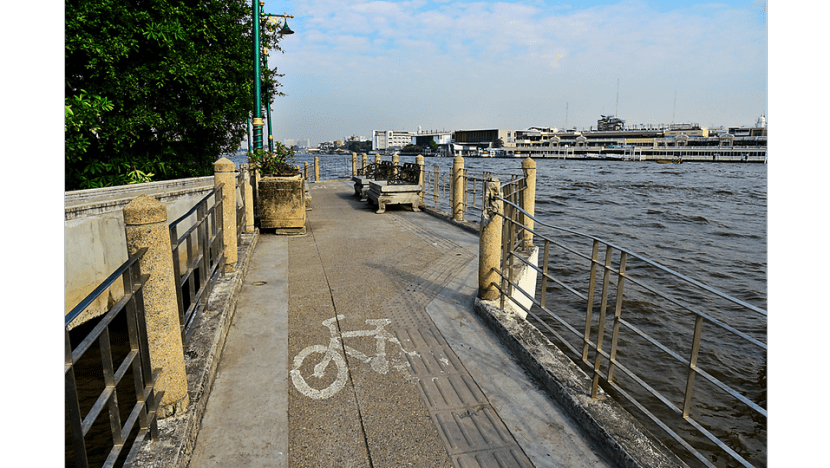
A bicycle lane along the Chao Phraya River in Bangkok. (Photo: Pichayada Promchertchoo)
However, these people still have to ride on pavements and main roads, as bicycle lanes are only available in central areas and around tourist attractions. Currently, the routes cover a distance of 365 kilometres but not all of them are practical. “They weren't designed with the big picture of Bangkok’s transport system in mind,” Sira said.
Bangkok faces a tough challenge as it tries to wake up from a traffic nightmare and become a more liveable city for its inhabitants. The worsening congestion is a clear sign that it needs fundamental changes to way its infrastructure develops, and urgently.
But according to Thanyarat, people first need to break free from the car culture.
"Change should start from respecting other people’s right to use public spaces. I wish Bangkok could one day be a friendly place not only to car users but also cyclists and pedestrians. And it won't happen as long as cars still dominate the road."
Follow Pichayada Promchertchoo on Twitter @PichayadaCNA














